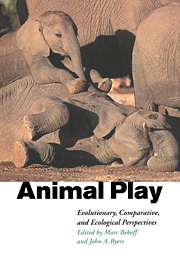Book contents
- Frontmatter
- Contents
- List of contributors
- Introduction
- 1 The evolutionary origins of play revisited: lessons from turtles
- 2 Play in common ravens (Corvus corax)
- 3 Object play by adult animals
- 4 Kangaroos at play: play behaviour in the Macropodoidea
- 5 Intentional communication and social play: how and why animals negotiate and agree to play
- 6 Structure-function interface in the analysis of play fighting
- 7 Sparring as play in young pronghorn males
- 8 Squirrel monkey play fighting: making the case for a cognitive training function for play
- 9 Self assessment in juvenile play
- 10 Biological effects of locomotor play: getting into shape, or something more specific?
- 11 Neurobiological sustrates of play behavior: glimpses into the structure and function of mammalian playfulness
- 12 Play as an organizing principle: clinical evidence and personal observations
- Index
12 - Play as an organizing principle: clinical evidence and personal observations
Published online by Cambridge University Press: 20 November 2009
- Frontmatter
- Contents
- List of contributors
- Introduction
- 1 The evolutionary origins of play revisited: lessons from turtles
- 2 Play in common ravens (Corvus corax)
- 3 Object play by adult animals
- 4 Kangaroos at play: play behaviour in the Macropodoidea
- 5 Intentional communication and social play: how and why animals negotiate and agree to play
- 6 Structure-function interface in the analysis of play fighting
- 7 Sparring as play in young pronghorn males
- 8 Squirrel monkey play fighting: making the case for a cognitive training function for play
- 9 Self assessment in juvenile play
- 10 Biological effects of locomotor play: getting into shape, or something more specific?
- 11 Neurobiological sustrates of play behavior: glimpses into the structure and function of mammalian playfulness
- 12 Play as an organizing principle: clinical evidence and personal observations
- Index
Summary
Introduction
By taking the reader along the play-path of my personal and professional life, I encourage readers to examine their own play experiences, attitudes, and observations. By reviewing my experiences sequentially, a gradually evolving broad view of the importance of, and speculations about what play is and what playfulness does, emerges. Play is seen as a broad category of behavior, as basic in its phenomenology to smart complex animals as sleep and dreams, and as scientifically enigmatic. Its healthy presence seems necessary for the maintenance of flexibility and adaptability.
I am a physician-psychiatrist by training and practice and more recently have engaged in independent scholarship, educational film production and popular writing (Brown 1987, 1988, 1995; Brown & Cousineau 1990; Brown & Moses 1995). As a method useful to me in making better sense of the world and its parts, I have generally relied on clinical observation, first to demonstrate a phenomenon and then have gone searching for ‘explanations’ which best explain and characterize it. This has worked well for me as a physician, and has enriched explorations in other areas. The general subject of play in animals and humans has gradually emerged as a broad category of behavior which warrants fresh exploration (Brownlee 1997). Thus the views given here about this complex and slippery subject will reflect my current efforts to place it in context as I have encountered it. My goals for this article are that it will offer the play enthusiast and student fresh ways of viewing the subject and stimulate personal examination of the cultures and biology of playfulness. I look upon this effort as if I was engaged in telling my story of play.
- Type
- Chapter
- Information
- Animal PlayEvolutionary, Comparative and Ecological Perspectives, pp. 243 - 260Publisher: Cambridge University PressPrint publication year: 1998
- 22
- Cited by

